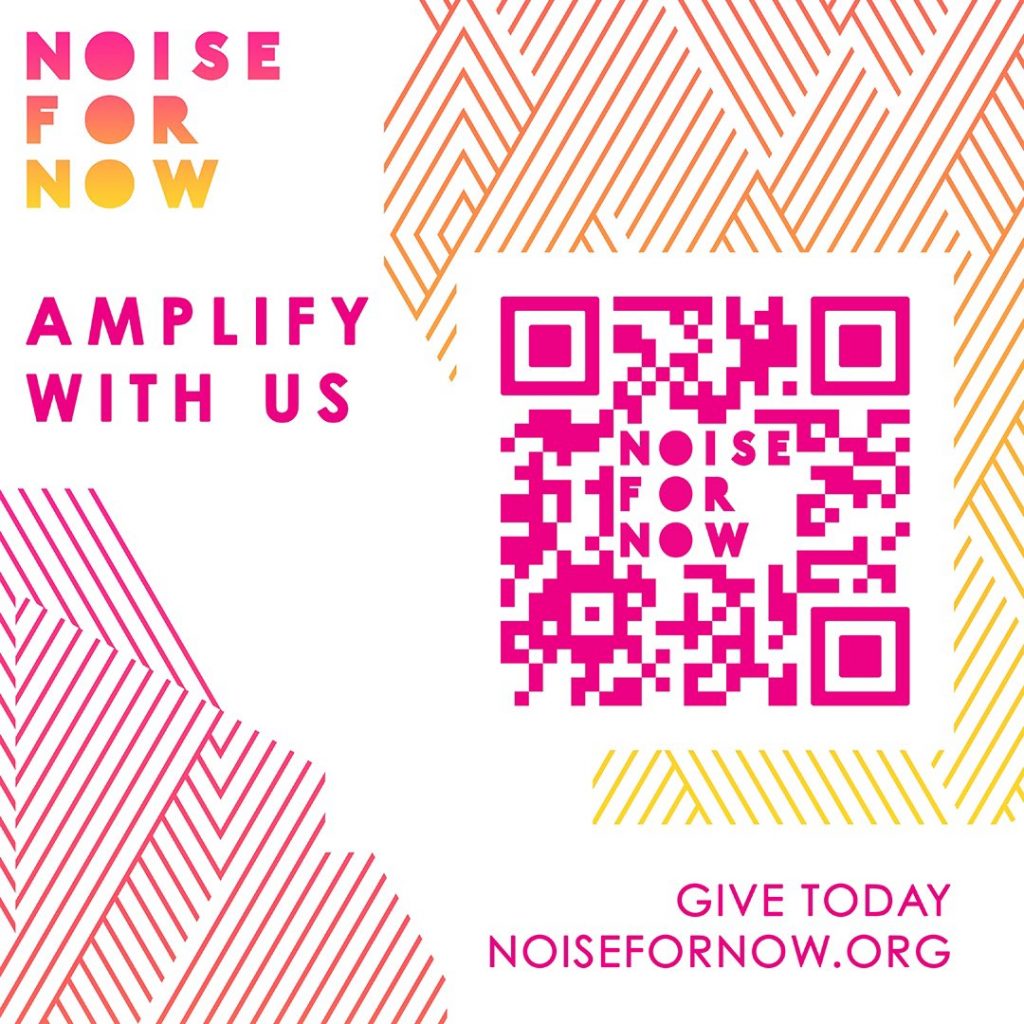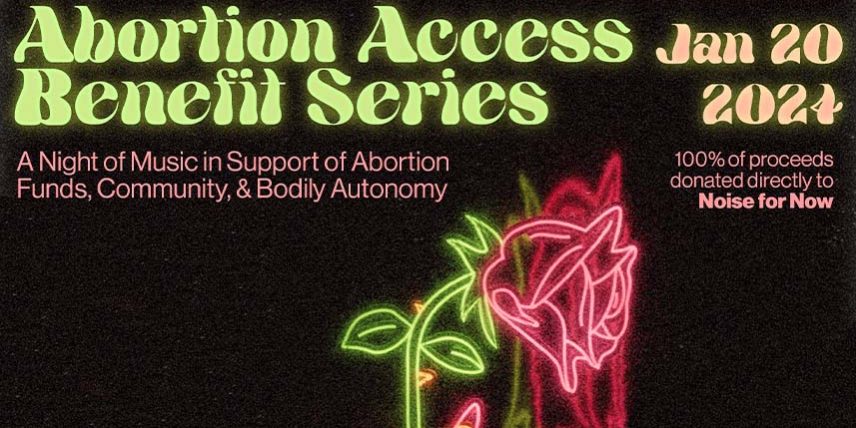*all photos credited to Kayla Hayashi
“You got a lot of power. As a creative individual you can output a lot of messages, yo. You’re way more effective than any politician.”
Reggie Watts 1/20/24
Improvised, created on-the-spot EDM from Reggie Watts, synchronized hitch kicks from the “anti-rock” Faux Real, dramatized undulations from Actually Huizenga of Patriarchy as she ran her tongue over an unsuspecting mic stand. With a diverse lineup embodying the DIY, the avant garde, and the sensational, the artists of the Annual Abortion Access Benefit Series appeared to have taken Watts’ meditations to heart, utilizing their talents to directly or indirectly protest the United States government’s usurpation of women’s bodies.
Co-hosted by Ground Control Touring and Noise for Now, the Abortion Access Benefit Series returned for its second installment on January 20th. While incarnations of the Benefit Series spanned 5 cities within the United States on the evening of the 20th, Highland Park’s Lodge Room felt a desirable venue in which to experience a night of universally-expressed frustration, fostering a temporary camaraderie among attendees. The venue itself was quaint, hosting a mere 500 guests, adorned with eclectic wallpaper interspersed with honey-wood beams.
As strips of multi-colored hardwood were concealed by vibrant high heels, heavy black boots, and the unusual tennis shoe, a kaleidoscopic crowd revealed itself, a manifestation of the event’s extensive lineup. The Benefit felt relaxed at the same time it felt intimate with chattering concert-goers taking residence on the Lodge Room’s makeshift graduated lounge space–carpeted platforms lining both sides of the main performance space. In a secondary performance space, “Checkered Hall,” attendees could indulge in a variety of services from tarot reading to tattooing. For a night, Noise for Now and Ground Control Touring transformed the Lodge Room into a haven for creatives, for those who supported them and those who had become disillusioned with the apathetic world outside the confines of the venue.
While the event was musical by nature, Noise for Now, “a national initiative that enables artists and entertainers to connect with and financially support grassroots organizations that work in the field of Reproductive Justice,1” ensured their mission was heard in selecting various speakers to push the cause. Between performances, introduced by lively host, comedian Ellen Harrold, the likes of Amelia Bauer, co-founder and executive director of Noise for Now, Dr. Nasseri, a medical director based out of a California women’s clinic, and a final Noise for Now representative, were all provided the platform to speak out on behalf of their respective organizations. While Bauer proudly highlighted Noise for Now’s financial achievements ($1.3 million distributed to clinics worldwide!) and Dr. Nasseri detailed his objections to the guilt and discomfort his clients expressed, the emerging underlying theme was purpose. In this instance, that purpose reflected the obligation to financially support California-based clinics as their target demographics exploded post-Dobbs. So as Harrold humorously panhandled the crowd to reach the $10,000 goal, the incentive to donate was clear in that California clinics, particularly those equipped to handle out-of-state patients, need our help. With that $10,000 goal looming over the heads of artists and concert goers alike, act after act took the stage, taking precious seconds out of their 10-minute sets to utter support for women’s bodily autonomy and right to reproductive care.
Given the stakes, the acts did not disappoint.
Performances ranged from shoegaze to indie rock to soft country to pop, peppered with vibrant DJ sets and guest appearances. Kicking off the night were performances by Anthony Anzaldo and Cold Gawd, the former manifesting a dreamy vibe as he gently strummed an electric guitar while the latter’s electrifying shoegaze doused the room in unrelenting noise. Cold Gawd, whose objective frontman Matt Wainwright defined as, to“make shoegaze black again,” were one of the night’s many highlights, generating a textured haze with resonant guitar chords and crashing drums, all transpiring within the drone emitted by layers of fuzz and distortion.
Austin Getz of Turnover followed, debuting gentler American Roots ballads. Inspired by his wife, Getz’ relaxed, romantic set was ephemeral, soon to be swept aside by Choir Boy’s energetic post-punk synth pop. Bright and brassy keys accompanied frontman Adam Klopp as his rich baritone erupted, reaching volcanic proportions seemingly too great to be housed within Klopp’s frame.
Sabrina Mae Teitelbaum’s, better known as Blondshell’s crystalline vocals were a breath of fresh air as she sang of betrayal and adulthood, her voice fluctuating between that of a somber alto and an elated soprano. A tough act to follow, Teitelbaum radiated a certain effortlessness as she paced the stage, her powerful voice soaring to new heights as she nonchalantly gazed out into the crowd. Lucky for comedian Tim Heidicker, his amiable personality was all he needed to execute an engaging, memorable set. A set that found Heidicker joking about drugs (cue Reggie Watts dousing himself in alcohol before generously soaking the crowd) and singing about bald eagles moving to Canada.
The night progressed with SadGirl’s surfpunk, the band’s tropical sound evoking the tranquility of an afternoon spent by the sea. The crowd was pulled out of their stupor with the arrival of Reggie Watts, who at last graced the stage with his own humorous yet captivating set that found him mixing his own improvised vocals in front of the crowd. A genius beat-boxer, impressionist and DJ, Watts swapped a British accent for a high-pitched feminine voice, looping his voice behind infectious beats that had the crowd simultaneously dazed and dancing.
Patriarchy, the LA-based metal creation of artists Actually Huizenga and The Drummer, put on a subversive, dark performance that was equal parts performance art and a musical journey into primal expressionism.
The 10-minute set found The Drummer, dressed in a thin tan slip dress, emitting guttural screams as they furiously pounded a standing drumkit, with Huizenga dowsing herself in water as she gyrated around her mic stand, sheer tulle skirt pulled over her head.
The pair were manifestations of non-conformity, echoed in Huizenga’s shrill cries as she vocalized her experiences with sex, society, and the patriarchy.
It seemed the event’s producers knew the crowd would need a minute to digest what they had just seen, making the following slot the ideal placement for Soltera. An experimental electronic project, Soltera’s ethereal set was equal parts dark and lively, infused with mastermind Tania Ordoñez’s vocal stabs.
The glam band Faux Real were natural successors to Patriarchy’s subversion, given their own playful take on performance art. Dressed in matching all-white sets which saw brothers Elliott and Virgile Arndt in pleated skirts over white, wide-leg jeans, the pair began an energetic performance featuring synchronized choreography and a clarinet.
Watching the pair felt like watching a bizarre talent show, a beautifully unhinged act that concluded with the brothers climbing off the stage into the crowd.
Wrapping up the night were electronic performances from Neggy Gemmy and Sextile. To me, Neggy Gemmy’s glitzy, animated performance accompanied by danceable synth pop tracks was very much reminiscent of her Y2K predecessors. A comparison exacerbated by Gemmy’s donning of low-rise cargo pants and rectangle-frame sunglasses, she was a visual manifestation of the 2000s as much as she was a musical one.
It seemed Sextile was determined to end the night on a high, with Melissa Scaduto beginning the 20-minute set timidly yet enthusiastically, spinning Jungle beats as her bandmates looked on from the wings As. Brady Keehn, dark glasses starkly juxtaposing a shock of bleach blonde hair, took over the deck, the stage became suddenly cluttered. Watching Reggie Watts writhe and groove with members of Choir Boy and Sextile felt like looking into an exclusive nightclub, lit in blues and purples where communities danced with abandon. It was a beautiful end to the night, a fully-realized celebration from artists who had come together with one common purpose: to use their platform for good.
The Lodge Room’s Second Annual Abortion Access Benefit was a triumph that traversed genres, an event equal parts education and entertainment. No two sets were remotely alike, yet the crowd remained attentive and polite; it would have been impossible to leave without having your interest piqued for a formerly-foreign soundscape. The stacked lineup seemed a “thank you” from Ground Control Touring and Noise for Now, a thank you for caring, for braving the rain, for supporting women’s reproductive health and freedom.





